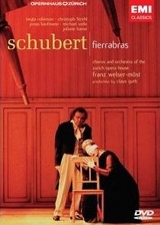|
|
|
|
|
|
|
|
| Opera News April 2008 |
| JOHN YOHALEM |
|
|
SCHUBERT: FIERRABRAS
|
| Banse, Robinson; Kaufmann, Strehl, Volle,
Polgár; Chorus and Orchestra of Zurich Opera, Welser-Möst. Production:
Guth/Hartmann. EMI Classics 5009699, 171 mins., subtitled |
|
 "Here
lie rich gifts and fairer hopes," sighs Schubert's epitaph — but in lied,
chamber music and symphony, the achievements of his thirty-one years stand
with anybody's. Of opera (which he hoped would make him rich, or famous) we
have only hints of what might have been — a clutch of wobbly little
singspiels and two grand operas on librettos appalling even by the standards
of early German Romantic opera. The plot of Fierrabras (1823), the latter of
these, is devious without rewarding close attention — love is variously
stymied by religious and social differences, but everyone is heroic and
honorable; disaster is averted when the Moors spontaneously become
Christian. However, the music, always charming and of its period (distant
horn calls out of Fidelio), lacks theatrical urgency. Also preventing
popular circulation, there are few extractable arias: most of Fierrabras
consists of ensemble, chorus and spoken dialogue over orchestral background,
though each turn of musical phrase is delectably Schubertian. "Here
lie rich gifts and fairer hopes," sighs Schubert's epitaph — but in lied,
chamber music and symphony, the achievements of his thirty-one years stand
with anybody's. Of opera (which he hoped would make him rich, or famous) we
have only hints of what might have been — a clutch of wobbly little
singspiels and two grand operas on librettos appalling even by the standards
of early German Romantic opera. The plot of Fierrabras (1823), the latter of
these, is devious without rewarding close attention — love is variously
stymied by religious and social differences, but everyone is heroic and
honorable; disaster is averted when the Moors spontaneously become
Christian. However, the music, always charming and of its period (distant
horn calls out of Fidelio), lacks theatrical urgency. Also preventing
popular circulation, there are few extractable arias: most of Fierrabras
consists of ensemble, chorus and spoken dialogue over orchestral background,
though each turn of musical phrase is delectably Schubertian.
All this being so, the wrenching of time and place and story typical of
European opera staging can hardly hurt. This recent handsome Zurich
production takes Fierrabras from Charlemagne's era to Schubert's, and the
principal (albeit non-singing) character is … Schubert. The tale of knight
errantry and siege is set in a Biedermeier study with striped paper,
wainscot, grand piano and cuckoo clock, and if Schubert seems nervous there,
perhaps it's because everything is three times life size, and getting to
chairs or keyboard requires a scramble. (Hanging the piano from the ceiling
during prison scenes also provides, um, suspense.) The characters —
Christian paladins wearing Schubert's waistcoat and glasses, Moors wearing
fezzes and dressing gowns — are evidently figments of his imagination, whom
he introduces and guides through the tale while composing it. The two rival
monarchs are unsympathetic paternal figures whom Schubert desperately tries
to placate.
Vocally, the men are most interesting here, especially Jonas Kaufmann as
the tormented, unloved but honorable Fierrabras, giving notice of a tenor of
range and flexibility, and László Polgár as the king whose perverse
willfulness is expressed by an anchoring bass. Twyla Robinson is sympathetic
as a noble Moorish princess, but her light, sweet instrument does not
possess the heroic weight to make the role effective (I suspect Schubert
wanted a Leonore here), while Juliane Banse, as Charlemagne's wayward
daughter, has an unattractive chalkiness in her upper register but holds her
own very well in ensembles. Chorus and orchestra make the most of Schubert,
but then they have much of the loveliest music. |
|
|
|
|
|
|
|
|
|
|
|
|
|
|
|
|